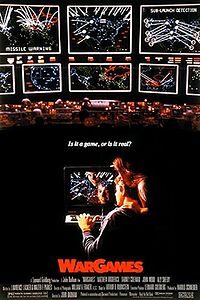 In 1983 I was going through a strange phase — I liked sitting in the front row at movies.
In 1983 I was going through a strange phase — I liked sitting in the front row at movies.
I guess I figured that if the screen filled my entire field of vision, that meant I was getting some kind of IMAX experience. The only one of my friends who shared this insane idea was my old Boy Scout buddy Zant Burdine. To think we were the first in line for the very first showing of Return of the Jedi at the Stamm theater, and when they opened the doors we headed straight for the front row. Yeah, good thing we got there early for those primo seats!
One of those 1983 front-row-center experiences was WarGames. Up to that point, director John Badham was best known for directing Saturday Night Fever (1977) and Blue Thunder, which opened about a month prior to WarGames. He went on to do the highly entertaining Stakeout (1987) in addition to some not-so-great stuff like Bird on a Wire (1990). At some point his films started using the vanity credit “A John Badham Movie,” as opposed to “A John Badham Film”; it made me wonder if he was making the statement that movies are meant to be fun entertainment while films are potentially more pretentious. (Directors Martin Scorsese and Paul Thomas Anderson routinely use the word “picture” in their vanity credits.)
For me, WarGames is Badham’s best movie. It’s certainly both fun and entertaining, but also quite intelligent as well, thanks to a superb screenplay by Lawrence Lasker and Walter F. Parkes, who went on to write another great movie together, 1992’s Sneakers. (After that Parkes turned exclusively to producing, often working with Steven Spielberg.) The riveting opening scene features Michael Madsen and John Spencer as two U.S. Air Force officers in a missile silo who receive a launch order. Both are required to turn each of their keys at the same time to launch the missile, but at the last minute Spencer can’t do it, leaving Madsen to pull a gun on his partner: “Turn your key, sir!”
Brilliantly, the scene turns out to be a drill — a test to see just how many people would actually be willing to launch a nuclear missile with only an order from a computer and no telephone confirmation. This scene establishes early on the conflict within the military: Dr. McKittrick (Dabney Coleman), the man behind NORAD’s WOPR (War Operation Plan Response) supercomputer, believes all officers should be taken out of the loop, while General Beringer (Barry Corbin) is extremely uncomfortable with the idea of leaving mankind’s fate in the hands of computers.
The real star of the movie is Matthew Broderick as David Lightman, the underachieving computer geek who’s the catalyst for the story. Before WarGames, Broderick was primarily known as a stage actor; his only film credit was Max Dugan Returns, released a few months earlier in ’83. Also terrific here is Ally Sheedy as Jennifer Mack, David’s friend from school. Prior to WarGames she had mostly acted in TV stuff, notably a few episodes of Hill Street Blues, her only film credit being the Sean Penn movie Bad Boys (released the same day as Max Dugan Returns, in fact — March 25, 1983).
Broderick and Sheedy work well together here, aided in no small part by the writing. There’s a particularly touching moment late in the film when David and Jennifer are trapped on an island at night and need to get back to the mainland to avert World War III. They’ve missed the last ferry, and Jennifer repeatedly suggests swimming for it until David blurts out, “I can’t swim … I never got around to it, okay? I always thought there was going to be plenty of time.” It’s a wonderfully written moment, and the two young stars are up to the task, playing it beautifully.
When I watched WarGames recently, though, I couldn’t help noticing Matthew Broderick’s computer setup, which I remember thinking back in ’83 was about as state-of-the-art as one could hope for in a home computer. It had a modem, for God’s sake — you could hook the computer up to a phone and actually communicate with another computer that would change your grades. Sweet! Twenty-six years later, of course, many of us carry a more powerful computer in our pockets every day.
The threat of nuclear war was ever present in 1983, and prominent in other feature films, like Testament, and the TV movies Special Bulletin and Nicholas Meyer’s excellent The Day After. The ultimate message of WarGames is a strong one, and even the WOPR supercomputer figures it out by studying tic-tac-toe — all nuclear-war scenarios end in a stalemate. “A strange game,” the computer concludes. “The only winning move is not to play.”
That climactic scene brings my friend Zant back into my story. See, back in 1983, front-row center, watching the supercomputer play out all the war scenarios (“U.S. First Strike — Winner None, USSR First Strike — Winner None, Far East Strategy — Winner None”) and hearing Arthur B. Rubinstein’s incredible score, Zant suddenly exclaimed in the loudest voice imaginable: “This is the ultimate movie!!!!”
I couldn’t pretend like I didn’t know him, because of course we were the only two people in the front row. And besides, I was pretty much thinking the same thing.
(Shameless plug for my day job: you can find the excellent Arthur B. Rubinstein score on Intrada, completely remixed from the original tracks, and produced under the supervision of the composer himself — who, by the way, really enjoyed my Zant story).

![Reblog this post [with Zemanta]](http://img.zemanta.com/reblog_e.png?x-id=cf891cf8-5724-4b31-bca5-d6ffde3f595c)



Comments